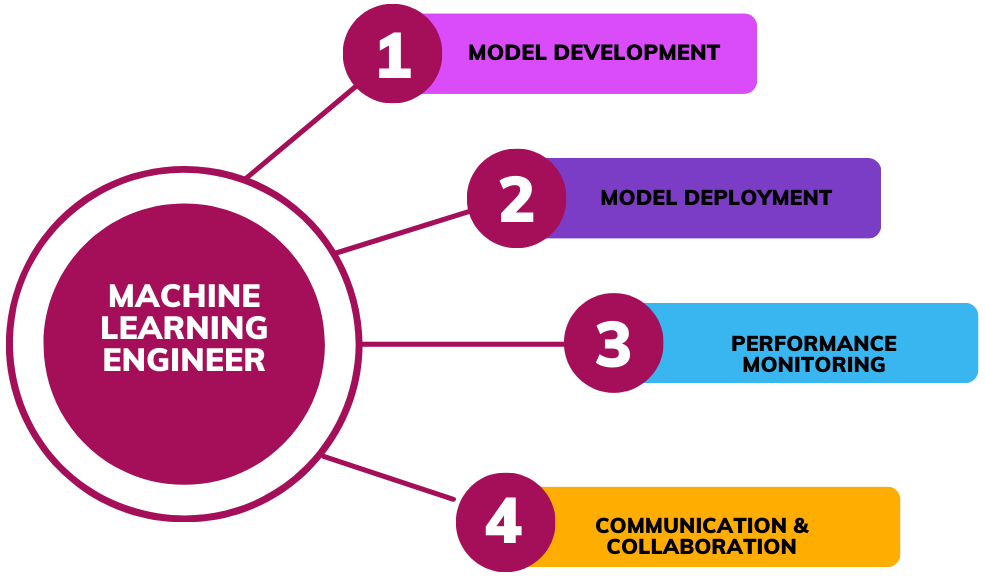What is a Machine Learning Engineer?
|
|
The current century has witnessed remarkable technological advancements, and artificial intelligence (AI) and machine learning (ML) are at the forefront of this development. These technological advancements have created many job opportunities, and one of them is the role of a Machine Learning Engineer. Businesses are increasingly adopting data-driven decision-making, and hence, there is a massive demand for ML engineers who can build, scale, and deploy ML systems.
This article aims to describe the ML engineer with a detailed understanding of their responsibilities, skills, tools, and career prospects. Before that, let us briefly understand what is machine learning.
| Key Takeaways: |
|---|
|

What is Machine Learning (ML)?
Machine learning (ML) is a branch of computer science concerned with AI. It uses algorithms to interpret data. ML includes everything from facial recognition to smartphone video surveillance. In customer-facing businesses, ML is used to understand patterns and preferences and design direct ad marketing campaigns.
Social media platforms use ML to target advertisements based on user preferences, likes, and posts on the social media platforms. Retail websites like Amazon use ML algorithms to provide buying suggestions based on customers’ purchases and browsing history.
In the medical field, ML algorithms analyse and interpret pathology results, such as biopsy test results. Thus, ML algorithms are used in most industries nowadays and play an essential role in analysing and interpreting the data. ML has become popular as a fascinating branch of AI that predicts and adapts outcomes as it receives more data. With the growth of AI and ML, the career paths in these fields are also experiencing rapid growth globally.
Role of Machine Learning Engineer
So, how do we define an ML engineer?
An ML engineer is a specialized software engineer who designs, builds, deploys, and maintains ML models and systems. ML engineers also integrate these models into scalable systems and make models developed by data scientists ready for real-world use.
The primary goal of ML engineers is to develop algorithms that perform tasks that are not explicitly programmed but learn and improve from experience. Generally, an ML engineer performs the following functions:
- Implement ML algorithms.
- Execute AI systems experiments and tests.
- Design and develop ML systems.
- Perform statistical analysis.
- Select appropriate data sets and pick appropriate data representation methods.
- Verify data quality and identify differences in data distribution.
- Transform and convert data science prototypes.
- Improve ML models using test results.
- Train and retrain systems when needed.
- Extend ML libraries.
- Develop ML apps as per client requirements.
- Stay up to date on new trends and technologies in ML and AI.
Overall, ML engineers should have a solid understanding of computer science concepts, mathematics, and statistics. An ML engineer usually works as part of a larger data science team and communicates with deep learning engineers, data scientists, data analysts, data engineers, data architects, and administrators.
ML Engineer: Key Responsibilities
Let us elaborate on the key responsibilities of ML engineers. The figure below shows the primary responsibilities of an ML engineer.

1. Model Development
ML engineers work with massive datasets to develop models that classify data or make predictions. The tasks include:
- Feature engineering
- Data cleaning and preprocessing
- Model selection (for example, regression, classification, clustering)
- Training and validation of data
Also read: How to Utilize Human-AI Collaboration for Enhancing Software Development
2. Model Deployment
Once the model is built, ML engineers should deploy it into production. The following tasks are performed as part of model deployment:
- Packaging models appropriately as APIs or microservices
- Using platforms like AWS SageMaker, Azure ML, or Google AI Platform
- Ensuring scalability and load efficiency of the model
Also learn about: MLOps Guide: Tools, Best Practices & Key Concepts
3. Performance Monitoring
Models must be monitored continuously for:
- Tracking model drift from the primary goal
- Ensuring accuracy remains intact and does not degrade over time
- Automating retraining pipelines
Also learn about: Machine Learning Models Testing Strategies
4. Communication & Collaboration
Machine learning engineers closely work, communicate, and collaborate with:
- Data scientists to refine models
- Software developers for integrating models into applications
- Product managers to understand business needs
- DevOps teams for CI/CD integration and infrastructure
Core Skills and Competencies of an ML Engineer
An ML engineer should possess specific core skills and competencies to perform these functions. These are listed as follows:
1. Programming
ML engineers should have strong programming skills and experience with ML libraries. An ML engineer should be proficient in the following programming languages:
- Python (most commonly used)
- R programming language for mathematical and statistical models
- Java or Scala (for big data applications)
- C++ (for performance-intensive tasks)
2. Mathematics and Statistics
An ML engineer should have a solid understanding of the following concepts:
- Linear algebra
- Calculus
- Probability theory
- Statistical modelling
3. Machine Learning Concepts & Frameworks
A familiarity with various machine learning algorithms and techniques is an essential skill that an ML engineer should possess. In addition, an ML engineer should also have an understanding of the following ML frameworks:
- TensorFlow
- PyTorch
- scikit-learn
- XGBoost
- Keras
4. Data Handling
For an ML engineer, understanding data structures and algorithms is crucial for building efficient and scalable systems. Apart from this, an ML engineer should also have experience with:
- SQL and NoSQL databases
- Data pipeline tools (e.g., Apache Airflow, Kafka)
- Data lakes and warehouses (e.g., Snowflake, BigQuery)
5. Software Engineering Practices
ML engineers are specialized software engineers and should possess software engineering skills, including:
- Version control (e.g., Git)
- Testing and debugging (Read: Testing vs Debugging)
- Agile methodologies (Read: What is Agile Software Development?)
- Code optimization
6. Cloud and DevOps
In addition to the above skills, ML engineers should know:
- Cloud platforms (AWS, GCP, Azure)
- Containerization (Docker, Kubernetes)
- CI/CD pipelines (Read: DevOps vs. CI/CD)
Education Background and Certifications of an ML Engineer
ML engineering is an emerging field, and as it grows, it has become increasingly competitive. Apart from getting a formal degree in the field, pursuing courses and certifications can help candidates showcase their abilities, validate their expertise, and deepen their knowledge of the ML field.
There is no single path to becoming an ML engineer, but typically, an ML engineer should have the following educational background:
- Bachelor’s or Master’s degree in Computer Science, Engineering, or Mathematics
- Specialized degrees or certifications in AI/ML
- Online courses from recognized institutes (for example, Coursera, edX, Udacity)
An ML engineer might gain more attention by acquiring one or more of the following certifications:
IBM Machine Learning Professional Certificate
IBM offers a machine learning professional certificate program on the Coursera online learning platform. This certification course equips students with ML algorithms, data science, and Python programming skills. It also covers deep learning, model evaluation, deployment, and data preprocessing topics. The program has six courses, and upon completion, a certificate is awarded to students from Coursera with a digital badge from IBM to demonstrate their ML expertise.
This certification program is suitable for individuals pursuing careers as ML engineers and professionals seeking to enhance their skills in their field. This certification does not require any prerequisites and costs $49 monthly for a Coursera subscription.
AWS Certified Machine Learning – Specialty Certification
This Amazon certification claims to improve one’s ability to design, develop, and create ML by using models with AWS Cloud. This certification program is available in multiple languages, including English, Chinese, Korean, and Japanese. An individual must score at least 750 to pass the exam, which costs $300.
Google’s Professional Machine Learning Engineer certification
This Google certification verifies a candidate’s expertise in designing, building, and deploying ML models using Google Cloud and other techniques. Attending and passing a two-hour exam covering ML topics is mandatory. The certification costs approximately $200 and is valid for two years, after which recertification is necessary.
Machine Learning Engineer Job Titles
Job titles for ML engineers vary across industries and organizations. There can even be an overlap of other data-related roles, such as data analyst, data engineer, and data scientist. Some of the standard titles for ML engineers include:
- Machine learning research scientist
- ML developer
- AI/ML engineer
- Junior machine learning engineer
- Senior machine learning engineer
- Machine learning software engineer
- Algorithm engineer
- Deep learning engineer
- Natural language processing (NLP) engineer
ML Engineer: Career Path and Growth
ML engineering offers excellent growth prospects for ML professionals. Possible career paths include:
- Senior Machine Learning Engineer
- ML Architect
- AI Researcher
- Engineering Manager
- Chief Data Officer (CDO)
Salaries for ML professionals are also in the higher bracket, reflecting the role’s technical complexity and business value. According to Glassdoor and Indeed, as of 2025, an ML engineer is offered the following salaries based on their experience:
- Entry-level MLEs: $90,000-$120,000
- Mid-level: $120,000-$150,000
- Senior/Lead: $150,000-$200,000+
Industries Hiring Machine Learning Engineers
With rapid advancements in the AI and ML fields, ML engineers are in demand across various sectors. Following is the list of industries where most of the ML engineers are hired:
- Tech: Google, Amazon, Meta, Microsoft
- Finance: JPMorgan, Goldman Sachs, FinTech startups
- Healthcare: AI diagnostics, predictive analytics, Pathology Analysis
- Retail: Recommendation engines, demand forecasting
- Manufacturing: Predictive maintenance, quality control
- Autonomous Vehicles: Tesla, Waymo, Cruise
Tips for Aspiring Machine Learning Engineers
Here are some tips for aspiring ML engineers for a successful career:
- Master the Fundamentals: Learn math, statistics, programming, and core ML concepts.
- Build Projects: Create end-to-end ML applications and deploy them.
- Contribute to Open Source: Gain experience and visibility by contributing to an open-source platform.
- Stay Updated: Stay current with the latest innovations by following conferences like NeurIPS and ICML and journals like arXiv.
- Network: Network with the ML community via forums, GitHub, and LinkedIn.
A Day in the Life of a Machine Learning Engineer
An ML engineer may include the following activities in a typical day:
- Morning Standup: Collaborating and communicating with cross-functional teams
- Data Exploration: Analyzing datasets, cleaning, and transforming
- Model Training: Coding to train and validate new models
- Code Review: Reviewing pull requests or receiving feedback
- Deployment Tasks: Packaging models and pushing updates
- Monitoring and Debugging: Checking system logs, addressing issues
- Learning Time: Staying updated with the latest ML research and tools
Machine Learning Engineer vs. Data Scientist
The roles of ML Engineer and data scientist are often confused. However, they are two different roles with distinct focuses. The following table summarizes the differences between them.
| Aspect | ML Engineer | Data Scientist |
|---|---|---|
| Focus | Deployment and scaling of models | Model development and business insights |
| Tools | Software engineering, ML frameworks | Statistical tools, notebooks (e.g., Jupyter) |
| Output | Production-ready systems | Insights, prototypes, visualizations |
| Collaboration | Engineers, DevOps, and product teams | Business analysts, stakeholders |
Sometimes the roles may overlap. Also, the data scientist builds the model in many organizations, and the ML engineer ensures it works in production.
Tools and Technologies Used in Machine Learning
Here is a breakdown of some popular tools that ML engineers can rely on:
| ML Frameworks |
|
|---|---|
| Data Tools |
|
| MLOps |
|
| Cloud Platforms |
|
| Deployment |
|
Challenges in the ML Engineer Role
Along with benefits and perks, challenges always come. Here are some of the challenges that an ML engineer faces:
- Data Quality: ML is good when data quality is excellent. Handling missing, inconsistent, or biased data is a significant challenge for an ML engineer.
- Model Drift: As real-world data continuously evolves, models that worked today may underperform tomorrow.
- Scalability: It is sometimes difficult to scale the model in real-time.
- Explainability: Most stakeholders, especially in regulated industries, often require interpretable results. Read: What is Explainable AI (XAI)?
- Ethical Considerations: An ML engineer’s essential responsibility is to ensure that models do not perpetuate bias or cause harm. Read: AI in Engineering – Ethical Implications
Conclusion
In today’s data-driven world, ML plays a very important role, and ML engineers are vital players in it. ML engineers transform theoretical models into practical, scalable applications that power intelligent solutions across industries. ML engineers have a rare blend of programming skills, mathematical rigor, and engineering acumen, that help in shaping the future of AI.
Whether you are a student considering a career, a software engineer pivoting into AI, or a data scientist seeking to expand your impact, a career in ML engineering offers good opportunities, wider challenges, and immense potential.
In essence, ML engineers bridge the gap between data science and software engineering effectively and enable the practical application of ML in various sectors.
Additional Resources
- AI Engineer: The Skills and Qualifications Needed
- AI and ML Top Agenda for APAC CIOs
- Top Mistakes in Software Standards Compliance
- What is the Role of Quality Assurance in Machine Learning?
| Achieve More Than 90% Test Automation | |
| Step by Step Walkthroughs and Help | |
| 14 Day Free Trial, Cancel Anytime |












